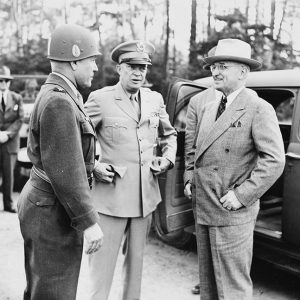calsfoundation@cals.org
Doyle Overton Hickey (1892–1961)
Doyle Overton Hickey served as an officer in the U.S. Army during World War I, World War II, and the Korean War, before retiring as a lieutenant general.
Doyle Hickey was born in Rector (Clay County) on July 27, 1892, the oldest child of John and Genie Hickey; he had two brothers and two sisters. John Hickey was a carpenter, and the family moved to Camden (Ouachita County) before 1900. Doyle Hickey graduated from Camden High School in 1909 and entered Hendrix College, graduating in 1913. Hickey studied law and worked at a lumber company in Memphis, Tennessee, before entering the U.S. Army in 1917. Trained at the First Officers Training Camp, Camp Stanley, Texas, Hickey received a commission as a first lieutenant in the Field Artillery Reserve.
Transferred to Camp Wheeler, Georgia, Hickey served with the 116th Field Artillery. Posted next, between July and October 1918, at the Field Artillery Training Center at Fort Jackson, South Carolina, Hickey served in France during the last days of the war at the Field Artillery Training Center at Camp Coëtquidan.
Returning to the United States in December, he reported to Camp Gordon, Georgia, and once again served with the 116th. In early 1919, Hickey attended the School of Fire at Fort Sill, Oklahoma, and joined the First Field Artillery upon the completion of the training. He also served as the provost marshal of Fort Sill in 1922, and after additional postings on the base, including attendance of the Field Artillery School, Hickey was transferred to the Tenth Field Artillery at Fort Lewis, Washington. Promoted to captain in 1924, Hickey served as the adjutant and aide to the commander of the Third Field Artillery Brigade before being posted to the Philippines with the Twenty-Fourth Field Artillery in 1928. Serving as provost marshal and post personnel adjutant, he returned to the United States in 1930 to join the Seventh Field Artillery. Two years later, Hickey took command of the park police and building guards in Washington DC, where he was involved with dispersing the Bonus Army.
In 1934, he entered the Command and General Staff School at Fort Leavenworth, Kansas, and graduated in 1936. Commanding an artillery battalion at Fort Lewis, Hickey next returned to the Philippines to serve on the staff of Brigadier General Francis Honeycutt. He returned to the United States in late 1940, still with the rank of captain. Serving at Fort Bragg, North Carolina, Hickey became the executive officer at the Field Artillery Replacement Training Center in 1941 and held that position when the United States entered World War II. After a brief assignment to the Office of the Chief of Field Artillery, Hickey trained at the Armored Force Headquarters at Fort Knox. He was assigned to the Third Armored Division, joining that unit at Camp Young, California.
The division moved to Great Britain and into France in June 1944. Hickey served as the executive officer of the division as a brigadier general. Leading part of the division across France and into Germany, Hickey took command of the unit on March 30, upon the death of Major General Maurice Rose. Hickey led the division during its last operation of the war, capturing the city of Dessau on April 24. After the surrender of the German army, Hickey returned to the United States and served at the Requirements Section of the Army Ground Forces, commanding that unit for a time. After another assignment at Fort Monroe, Virginia, Hickey was named as the Deputy Chief of Staff, Far East Command, under General Douglas MacArthur. Named as the acting chief in 1949, he received the permanent post of Chief of Staff of the Far East Command and Headquarters, Supreme Commander of Allied Powers, in 1951. Serving in Tokyo, Hickey was involved with the planning of operations during the Korean War. He held that position until his retirement in 1953 at the rank of lieutenant general.
Hickey married Sophronia Brown on April 30, 1917. The couple did not have any children. After his retirement, the couple moved to Sophronia’s native Mississippi. Hickey died on October 20, 1961, in Jefferson, Louisiana. He is buried in Pass Christian, Mississippi.
For additional information:
Blakely, H. W. “When the Army Was Smeared.” Combat Forces Journal (February 1952): 26–30.
Derby, George, and James White. The National Cyclopedia of American Biography, Vol. 50. New York: J. T. White Company, 1968.
David Sesser
Henderson State University
 Military
Military World War II through the Faubus Era, 1941 through 1967
World War II through the Faubus Era, 1941 through 1967 D. O. Hickey
D. O. Hickey 




Comments
No comments on this entry yet.